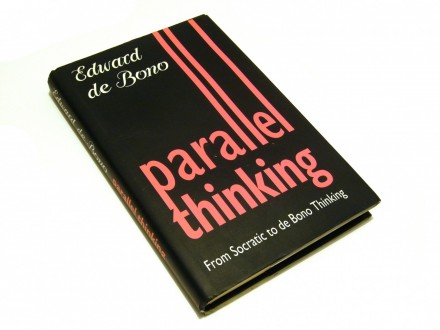Edward De Bono - Parallel Thinking
| Cena: |
| Želi ovaj predmet: | 2 |
| Stanje: | Polovan bez oštećenja |
| Garancija: | Ne |
| Isporuka: | Pošta Post Express Lično preuzimanje |
| Plaćanje: | Tekući račun (pre slanja) Lično |
| Grad: |
Beograd-Zvezdara, Beograd-Zvezdara |
ISBN: Ostalo
Godina izdanja: 1994
Jezik: Engleski
Autor: Strani
Edward De Bono - Parallel Thinking: From Socratic to De Bono Thinking
BCA / Penguin, 1994
228 str.
tvrdi povez
stanje: vrlo dobro
The premise of this book is that in today`s rapidly changing world the thinking of the traditional thinkers, Socrates, Plato and Aristotle, based on analysis, judgement and argument, is no longer enough. De Bono argues that we need to move towards a more constructive, creative and design-based system of thought. The book outlines the techniques and applications of parallel thinking in both personal and professional life.
Parallel thinking is a term coined and implemented by Edward de Bono. Parallel thinking is described as a constructive alternative to `adversarial thinking`, debate and in general the approach the GG3 (Greek gang of three)[clarification needed] has been known to advocate. In general parallel thinking is a further development of the well known lateral thinking processes, focusing even more on explorations—looking for what can be rather than for what is.
Parallel thinking is defined as a thinking process where focus is split in specific directions. When done in a group it effectively avoids the consequences of the adversarial approach (as used in courts).
In adversarial debate, the objective is to prove or disprove statements put forward by the parties (normally two). This is also known as the dialectic approach. In Parallel Thinking, practitioners put forward as many statements as possible in several (preferably more than two) parallel tracks. This leads to exploration of a subject where all participants can contribute, in parallel, with knowledge, facts, feelings, etc.
Crucial to the method is that the process is done in a disciplined manner, and that all participants play along and contribute in parallel. Thus each participant must stick to the specific track.
Non Fiction, Psychology, Philosophy
Plaćanje pouzećem i postnetom za sada nisu opcija.
Lično preuzimanje je isključivo na Konjarniku uz prethodni dogovor.
Hvala na razumevanju.
Predmet: 30186009







